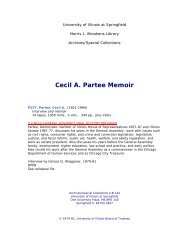Charles C. Patton Memoir - University of Illinois Springfield
Charles C. Patton Memoir - University of Illinois Springfield
Charles C. Patton Memoir - University of Illinois Springfield
Create successful ePaper yourself
Turn your PDF publications into a flip-book with our unique Google optimized e-Paper software.
in school, and lived there till he became educated, then moved<br />
back to <strong>Springfield</strong>, and lived in that house that's on the<br />
northeast corner <strong>of</strong> second and Lawrence Avenue. Still stands<br />
there. It was just a block west <strong>of</strong> the Frank Lloyd Wright House.<br />
Now, her oldest son took over the. . . when my grandfather died,<br />
the oldest son took over the mining business and ran it till he<br />
died, and that was sold, and World War 1 came along, the business<br />
was sold to the Peabody Coal Company. And incidentally, the<br />
property, the property during World War I out at Clear Lake was<br />
forested for walnut. The Government cut dawn all the walnut<br />
trees to be used for making gun stocks, and they had huge piles<br />
<strong>of</strong> walnut logs there at the end <strong>of</strong> the war there that never got<br />
used, actually. But my uncle, who was the second brother, whose<br />
name was Jack Jess was a mining engineer, went to Princeton, and<br />
he was hired by some, at one time, by some mining men in New<br />
York, who had invested in some gold mine in Alaska. He was hired<br />
to go up to Alaska and to survey this gold mine up there and<br />
report back what he thought <strong>of</strong> its value. Well, he was<br />
shipwrecked on the way up, and was. . . I don't know much about<br />
that story, except it came out in the newspaper here in<br />
<strong>Springfield</strong>, and somebody read the story, and quickly went to my<br />
grandmother's hause and picked up the newspaper so she wouldn't<br />
read it.<br />
Q. what ye8r was that?<br />
A. Can't remember what year it was. Probably about in the '20's<br />
sometime, maybe. Don't remember if it was before World War I or<br />
after. I think it was after W W I. But he was saved and he did<br />
go out and survey this gold mine and we have some <strong>of</strong> the records<br />
that he kept which show how much he had to pay for a dog team,<br />
how much for a horse, how much for food and lodging for the week,<br />
which was interesting, and he, he had some pictures <strong>of</strong> that which<br />
we still have also. But the youngest son was blind from birth,<br />
learned how to play the piano fairly well, and he lived with the<br />
next oldest son, whose name was Bob. Bob had been divorced from<br />
his first wife and lived in a house on Lowell Avenue. But he<br />
took care <strong>of</strong> the blind son too, but forbad him to play the piano<br />
cause he couldn't stand the racket, so this guy, this blind boy,<br />
just listened to the radio and wound the clock and somebody came<br />
and took him for a walk everyday, but he survived all the rest,<br />
and the estate was put in trust for him, and it took care <strong>of</strong> him,<br />
and so, we didn't inherit anything from the estate until he died<br />
which was, oh, quite a long time after my mother died. Then we<br />
inherited all this Clear Lake property, the Sand and Gravel<br />
Company and finally divided it up amongst the nieces and nephews.<br />
Q. Have they sold it, or are they living on it.<br />
A. It's all been sold. And they're all dead now. I<br />
Q. So then, <strong>Springfield</strong> Lake came in. What can you t 11 me<br />
4

















